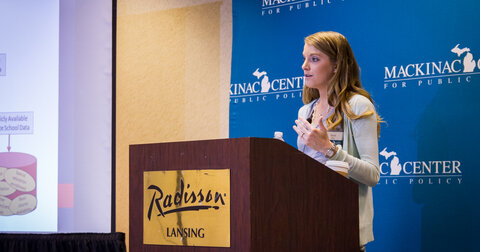Michigan Private Schools Cost Significantly Less Than Public Schools
And other data from the state's first major private school survey
LANSING — Due to their nature as independent, self-supporting institutions, private schools do not disclose data about themselves in a standardized format, which sometimes clouds the public's understanding of them. A new report, though, sheds some light on the private school landscape in Michigan.
Rachel White, a doctoral candidate at Michigan State University, gave a presentation on Thursday about her new study of the private education sector. White spoke at the Mackinac Center for Public Policy’s Issues and Ideas Forum.
While 601 private schools serving 113,000 students operate in Michigan, little research has been done to understand these institutions. When discussing her new study, White said, “The children in the private school system are not an insignificant number. … This data provides a unique look and valuable information about the state of our private schools.”
Despite the popular perception that private schools are pricey institutions, they are, in fact, significantly less expensive than public schools. The average tuition for private school primary students is $4,700 while high schools charge $7,800. In contrast, the state foundation allowance for every public school pupil is about $7,400 while the total spending of the average district is around $13,000 per student each school year.
The lower spending levels do not come from employing an uneducated or unqualified workforce, however. The study found that 98 percent of private school educators hold at least a bachelor's degree, and 82 percent are accredited by the state of Michigan. Additionally, private schools constantly administer student achievement tests — exams which measure students against their peer groups — to ensure that education standards are met. They tend to rely more on private assessments, such as the ACT or SAT examinations, than on Michigan’s official test, the M-STEP.
More importantly, said White, "Private schools are not taking a one-size-fits-all approach to tuition.” Many schools use a sliding scale based on income, and some charge each family a percentage of its income. The study also found that private schools that serve more underprivileged children cost less and provide more financial aid than private schools serving fewer underprivileged students.
“Private schools educate over 100,000 students in Michigan. Thus, it is important to understand the makeup and characteristics of these schools,” White said. “This report provides new information about private schools that should be useful for policymakers, educators and parents.”
The study, "Survey of Michigan's Private Education Sector," is published by the Mackinac Center for Public Policy, which also publishes Michigan Capitol Confidential.
~~~~~
A video replay of the event:
Michigan Capitol Confidential is the news source produced by the Mackinac Center for Public Policy. Michigan Capitol Confidential reports with a free-market news perspective.


 Growing Michigan Together Council says more education spending will draw people to state
Growing Michigan Together Council says more education spending will draw people to state
 Whitmer claims historic investment in student mental health resources
Whitmer claims historic investment in student mental health resources
 Michigan’s school funding amendment is a harmful relic
Michigan’s school funding amendment is a harmful relic